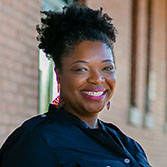How do you advocate for others?
I advocate for others by speaking up, and bringing humility whenever there is an opportunity to learn. I pay attention to and learn from my own discomfort.
I follow reputable news sources and social justice leaders on Instagram (Rachel Lindsay from the Bachelorette, Matt Bernstein, and Oprah) and promote their posts that I connect with on my story. I do this to show my peers that I am an ally and promote information that I think is interesting or that taught me something new.
I start by humbling myself to see how I can be of the most help to someone I may want to advocate for. It doesn't do them any good if it's about me. When necessary/appropriate, I want to serve, encourage, empower, and support them to the best of my ability by coming alongside and being present in their life.
I acknowledge barriers and work to have them removed to make processes, policies, and procedures more equitable.
In one-on-one relationships, I get to know people. When someone isn't able to speak up for themselves or their voice isn't being heard, I echo and amplify their voice if they're OK with it. I advocate for change by showing up, speaking up, being a conscious consumer, voting in local and national elections, and donating time and money.
Be proactive in listening, accepting, and welcoming people and ideas that are different from my own.
I start by humbling myself to see how I can be of the most help to someone I may want to advocate for. It doesn't do them any good if it's about me. When necessary/appropriate, I want to serve, encourage, empower, and support them to the best of my ability by coming alongside and being present in their life.
I advocate for others by hearing their concerns and providing them with relevant resources. I have visited many spaces such as the PRCC, MRC, Global Programs, Center for Sexual and Gender Diversity, Student Disability Resources, etc., and know of their resources and staff members. I am always happy to describe these resources to others!
By encouraging friends to consider other perspectives when in conversation. By giving examples of lived experiences other than our own when conversing with family members. By asking friends and family to take in the world around them and not be narrow minded in their thinking.
As an individual, I educate myself widely so that I am prepared to be an ally when people need me to be; I amplify others’ voices and speak up when I see or hear something that does not sit right with me. As a parent, I make sure that diversity and advocacy are integral parts of our family’s life and how we show up in the world. As a professional, I’m always trying to make educational experiences and resources as accessible, equitable, and inclusive as possible. As a community member, I vote, volunteer, and give, and I serve on a social action committee with the mission of making our community a more just and equitable place to live. There are so many ways to advocate for others. It has taken me years to get to where I am today, and there is so much further for me to go. Advocacy is truly the work of a lifetime.
By listening. Finding ways, when possible, to encourage others to advocate for themselves. Call for help by enlisting others who know and experienced something I don't know, did not have to work through.
I try to advocate for others by attempting to make sure that opinions and thoughts of a wide variety of people are considered when making decisions that are going to affect a broad spectrum of people. It is impossible for me to accurately represent the feelings of the vast majority of people, so I look to make sure that they are included with seats at the table when considering important choices. At Penn State, I also make sure that the students I work with are made aware of the various resources available for students of a wide variety of backgrounds.
In order to advocate for others, I strive to contribute to creating welcoming spaces in my personal and professional life. Often, this includes recognizing and utilizing my privilege as a white male in order to stand up for others who historically have not had the power to do so and call out injustices when I see them, even if it makes others uncomfortable.
I advocate for others by first listening to their concerns and making sure that I understand their needs. Then I try to partner with them to find a solution, and ask others to hear their concerns and voices to reach a resolution.
To advocate for others, I seek information and identify supporters and partners. Then I compile that information and present it to those that can take action. Sometimes this process is fast and results quickly realized. Sometimes this process is slower and takes several cycles to see change.
In my role as an academic adviser, my goal is to listen and empathize with students so that they feel truly heard on our campus and then take action along with the student, empowering and supporting them. If I am not a person that my student feels close to, that is okay, and I will connect them to other resources and communities where they feel they can share. I strive to foster a relationship of trust and empathy with all my students. We all need safe spaces.


















